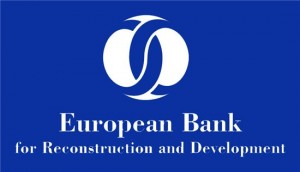 The European Bank for Reconstruction and Development (EBRD) and the National Bank of Kazakhstan have signed two agreements that will allow the EBRD to source up to $1 billion in tenge from the NBK to use for loans to local institutions in local currency, the EBRD reported on May 21.
The European Bank for Reconstruction and Development (EBRD) and the National Bank of Kazakhstan have signed two agreements that will allow the EBRD to source up to $1 billion in tenge from the NBK to use for loans to local institutions in local currency, the EBRD reported on May 21.
The two agreements include one repurchase agreement that will make the tenge equivalent of $400 million available to the EBRD and a second swap framework agreement for the equivalent of $600 million to be provided over a three-year period. The agreements were signed by National Bank Governor Kairat Kelimbetov and EBRD Managing Director Olivier Descamps during the Astana Economic Forum held in the Kazakh capital from May 21-23.
At the signing, Descamps said, “This step by the National Bank of Kazakhstan is extremely important for the EBRD and for Kazakh businesses, which will benefit from our financing in tenge. Our strategic priorities in Kazakhstan focus on diversification, development of the regional infrastructure and strengthening the role of the private sector. These priorities require us to lend more to local businesses in local currency. Today’s agreements open the door for us to significantly increase and improve our lending in tenge.”
Kelimbetov said, “Thanks to today’s agreements, the EBRD will be able to increase lending for projects with Kazakh banks, non-banking financial institutions and corporate clients. This will be especially important for micro and SME [small and medium-sized enterprises] clients who need protection from foreign exchange risk.”
Kazakhstan, which became a donor to the EBRD in 2013, has received nearly $6.5 billion in investment from the EBRD since operations in the country began. A major oil producer, Kazakhstan is currently engaged in a number of state-sponsored activities intended to diversify its economy and upgrade its banking system.
The current strategy of the EBRD in Kazakhstan focuses on supporting the non-resource sector, balancing the role of the state and the market by promoting the private sector and providing access to credit, and promoting low-carbon growth and energy efficiency. Recent EBRD projects in the country have funded energy-efficient buses, rolling stock purchases by a public-private transport company and a project to modernise home heating systems.
